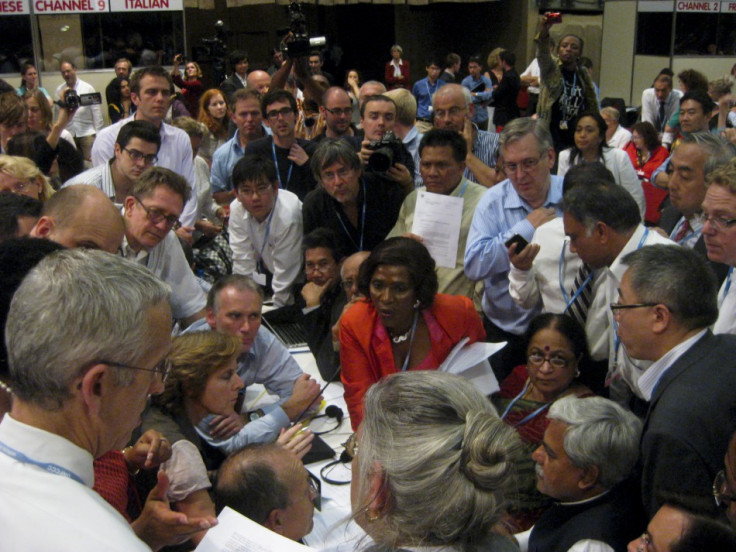Climate Change Summit: Global Deal Recovered After Marathon Talks in Durban

Following marathon talks, the United Nations climate conference agreed in the early hours of Sunday on a deal to legally bind the world's largest carbon emitters.
As talks overran into their second day on Sunday, officials and diplomats agreed to the so-called Durban Platform, a two-page, eight-point guide that some critics noted as vague.
The platform will force the world's biggest carbon emitters, including the United States, China and India, to slash emissions for the first time under a single legal framework.
It will also commit all countries to a global deal on cutting emissions by 2015 and will be enforced by 2020.
U.N. officials said it was a "historic breakthrough to save the planet" that compensates for the collapse of the last attempt to agree on a global deal during the 2009 talks in Copenhagen.
But countries most vulnerable to the impact of climate change have said that waiting until 2020 to enforce the new agreement will not be enough to save small island states from sea levels rising or halt severe weather conditions.
Emissions need to peak and begin dropping before 2020 to achieve the maximum climate change of only 2 degrees Celsius, according to U.N. scientists.
U.K. Energy and Climate Change Secretary Chris Huhne described the agreement as a huge success for Europe.
He noted that it was the first time that the "Big Three", the U.S., India and China, which collectively account for almost half of the world's carbon emissions, have agreed to cut their carbon output as part of a legal treaty.
"What we have done today is a great success for European diplomacy. We have managed to put this on the map and take the major emitters - the U.S., India and China - to a road map that will secure an overarching deal," he told the Telegraph.
The deal was achieved after nearly 14 days of official talks.
The Green Climate Fund was also launched, a $100 billion annual fund earmarked to support developing and vulnerable countries by 2020 - a project born under the 2009 Copenhagen climate talks.
Christiana Figueres, the executive secretary for the United Nations Framework Convention on Climate Change, was overjoyed by this success.
Citing the words of Nelson Mandela via her Twitter account, she said: "In honour of Mandela: It always seems impossible until it is done. And it is done!"
Durban Talks All Principle, No Action
In contrast, Adrian Ramsay, the deputy leader for the U.K. Green Party, said while important progress was made in the last hours of the Durban climate change conference, he was disappointed to see wealthy nations fail to take a stronger position at the talks.
"It's concerning that governments are still focused on the principles and not the actions," he said.
"I want to see the governments of richer countries taking the lead and showing what can be done."
While Europe's strong stance at the Durban talks may have influenced others to come to an agreement, Mr Ramsay said richer countries still need to "lead the way" in creating a healthy and stable environment for the future.
"What we needed at this conference was to see targets coming in place that would be binding and start a lot sooner," he said.
Since this did not happen in Durban and there will, potentially, be a time frame in which no agreement is active, Mr Ramsay said wealthier countries need to step forward and initiate progress to help bring it about.
"The Durban talks should've been about action instead of principle," he said. "It would've been much better to have a proper legally-binding agreement come out of Durban."
Doug Parr, policy director at Greenpeace U.K., concurred with Mr Ramsay, saying the outcome of the talks in Durban was blocked by countries such as the U.S.
"It [the outcome] is better than nothing but it's not great, particularly if you compare it with what's needed," he said.
While Mr Parr was pleased with the EU's strong stance going into the climate talks and its ability to produce the EU road map, he is not hopeful of progress elsewhere in the immediate future.
Benefits of Taking Early Action on Climate Change
Mark Kenber, CEO of The Climate Group, said the new deal, set to be negotiated by 2015 but not enforced until 2020, entailed too long of a wait for serious action on climate change.
"But this was clearly the price they had to pay to get major emitters on board," he said.
As the world comes out of recession and science continues to demonstrate the impact of climate change, Mr Kenber said he hopes to see further progress from countries which are able to raise their ambitions to meet targets and reduce emissions.
"It makes good business and economic sense to take early action," he said.
The EU agreed to a second commitment period of the Kyoto Protocol from 2013 as part of the deal achieved in Durban, so that the world has a legal treaty in place to cut emissions before 2020.
Mr Kenber said the leadership that has been shown may result in other countries voluntarily committing to it as well.
"Kyoto is very important in creating continuity," he said, adding that he hopes to see countries work together to collectively raise their ambitions to tackle climate change.
The UN climate change conference, formally known as the 17th Conference of the Parties (COP17), was held in Durban, South Africa from 28 November to 9 December, 2011.
© Copyright IBTimes 2025. All rights reserved.





















